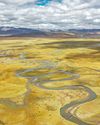Four Explorers Discuss How They Use Their Expeditions To Promote Environmental Consciousness, Inspiring Public Action To Mitigate Climate Change

Explorer Tim Jarvis recalls getting lost in the bush in Malaysia at the age of 12, and finding his way home by walking east towards the coast. “I always carried a compass with me. I remember finding my way through a section of jungle in Johor, and it gave me a real sense of satisfaction having done that. That feeling of resourcefulness that you can negotiate the outdoors with a bit of skill and self-reliance really stuck with me.”
Jarvis describes his expeditions as being an extension of this inquisitiveness, and attributes his environmental activism to a love of the outdoors, and the increasing realisation that we need to protect it. This led him to study environmental science and environmental law. “I now find that my expeditions, and the books and films I do, give me a wonderful vehicle to communicate environmentalism to people, when they might otherwise not listen,” he says.
Jarvis conducted his first major expedition in 1996, walking 500 kilometres across the ice sheet of Spitsbergen in the Norwegian Arctic, unsupported. The early 1990s was in the infancy of the GPS, so he navigated with paper maps and compasses. “Polar bears were stalking us, so I had to learn to use a gun, and navigate very accurately. There’s not much margin for error,” he shares.
Three years later, he was joined by fellow adventurer Peter Treseder, completing the fastest unsupported journey to the South Pole, covering 1,580 kilometres in 47 days.
He then completed an unsupported crossing of the Great Victoria Desert in 2001, walking 1,100 kilometres. The next year he set offf or the North Pole, crossing 400 kilometres of frozen Arctic ocean.
This story is from the {{IssueName}} edition of {{MagazineName}}.
Start your 7-day Magzter GOLD free trial to access thousands of curated premium stories, and 9,000+ magazines and newspapers.
Already a subscriber ? Sign In
This story is from the {{IssueName}} edition of {{MagazineName}}.
Start your 7-day Magzter GOLD free trial to access thousands of curated premium stories, and 9,000+ magazines and newspapers.
Already a subscriber? Sign In

A Spectrum Of Scarlet: The Symbolic Red Of Asian Flags
A common thread that unites many Asian flags is the prominent use of red, a colour rich with symbolism

Curry: A World of Flavour, Tradition, and Culture
From its humble beginnings in India, the concept of "curry" has evolved into a culinary language understood around the world

The Power Of Asian Red Fruits - Discover 10 Nutrient-Rich Gems Of The East
In the vast tapestry of Nature, Asia has gifted the world an array of unique and vibrant fruits, particularly those in shades of red. These scarlet-hued gems, packed with flavour and nutrients, not only add a burst of colour to your plate but also carry valuable health benefits. From antioxidant-rich goji berries to the exotic dragon fruit, let's explore some of the most popular red fruits from Asia and discover why they should be part of your diet.

Bhutan: A World Of Its Own
With its majestic monasteries, red-robed monks, charming rural villages, and vibrant festivals, the Kingdom of Bhutan is a Himalayan paradise that promises an enriching travel experience like no other

Take The Red Pill
From the vermilion torii gates of Japan to the famed rust-hued walls of India's Agra Fort, the burgundy robes of Burmese monks to scarlet chillies drying in the Bangladeshi sun, red is the quintessential colour of Asia.

70 Days for Our Land Animals
Raising awareness about conservation, the environment, and the land-dwelling species of the world

The Red Panda
Meet the elusive guardian of the Eastern Himalayas

Revealed Doctor Yellow
Japan Railways' special lemony Shinkansen is a rare sight to behold

The Mighty Yellow
Over 5,000 kilometres long and flowing through nine provinces and autonomous regions, the Yellow River is China's second largest, after the Yangtze, while its basin is deemed the cradle of Chinese civilisation

Wildlife Big Yellow Beauty
The popular "amelanistic" form of the Burmese python is considered among the most beautiful snakes - if that's your sort of thing